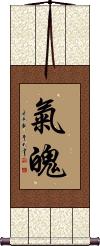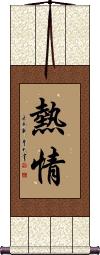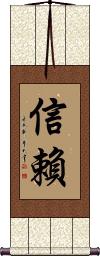Many custom options...
And formats...

Not what you want?
Try other similar-meaning words, fewer words, or just one word.
Positive Attitude in Chinese / Japanese...
Buy a Positive Attitude calligraphy wall scroll here!
Personalize your custom “Positive Attitude” project by clicking the button next to your favorite “Positive Attitude” title below...
Positive Attitude
Enthusiasm
熱情 is a Chinese and Korean word for enthusiasm that can also be translated as passion (for a cause), ardency, ardor/ardour, enthusiasm, or zeal.
Enthusiasm is being warm, cheerful, happy, and full of spirit. It is doing something wholeheartedly and eagerly. When you are enthusiastic, you have a positive attitude.
In some contexts, this could mean being extremely fond of something or having a fondness for a cause or person.
This Chinese word can also be translated as "sincere and warm" or literally "warm sentiment / affection."
See Also: Motivation | Passion | Commitment | Tenacity
Trust / To Have Faith
信賴 can also be translated as confidence, reliance, or dependence; thus, it can also mean “to rely on” or “to depend on.”
Trust is having faith in someone or something. It is a positive attitude about life. You are confident that the right thing will happen without trying to control or make it happen. Even when difficult things happen, trust helps us to find the gift or lesson in it.
![]() There is a slight deviation in the Japanese Kanji form of the second character. If you want the modern Japanese version, please click on the special Kanji shown to the right instead of the button above. Note that the traditional Chinese form is still readable and understood by Japanese people.
There is a slight deviation in the Japanese Kanji form of the second character. If you want the modern Japanese version, please click on the special Kanji shown to the right instead of the button above. Note that the traditional Chinese form is still readable and understood by Japanese people.
See Also: Confidence | Truth | Honor
This in-stock artwork might be what you are looking for, and ships right away...
Not the results for Positive Attitude that you were looking for?
Below are some entries from our dictionary that may match your Positive Attitude search...
| Characters If shown, 2nd row is Simp. Chinese |
Pronunciation Romanization |
Simple Dictionary Definition |
氣魄 气魄 see styles |
qì pò qi4 po4 ch`i p`o chi po |
More info & calligraphy: Positive Attitude |
陽性 阳性 see styles |
yáng xìng yang2 xing4 yang hsing youshou / yosho ようしょう |
positive; masculine (adj-no,n) (1) (ant: 陰性・1) positive (result); (adj-na,adj-no,n) (2) positive (attitude); cheerful; optimistic; (personal name) Yōshou |
The following table may be helpful for those studying Chinese or Japanese...
| Title | Characters | Romaji (Romanized Japanese) | Various forms of Romanized Chinese | |
| Positive Attitude | 氣魄 气魄 | qì pò / qi4 po4 / qi po / qipo | ch`i p`o / chipo / chi po | |
| Enthusiasm | 熱情 热情 | rè qíng / re4 qing2 / re qing / reqing | je ch`ing / jeching / je ching | |
| Trust To Have Faith | 信賴 信赖 | shinrai | xìn lài / xin4 lai4 / xin lai / xinlai | hsin lai / hsinlai |
| In some entries above you will see that characters have different versions above and below a line. In these cases, the characters above the line are Traditional Chinese, while the ones below are Simplified Chinese. | ||||
Successful Chinese Character and Japanese Kanji calligraphy searches within the last few hours...







